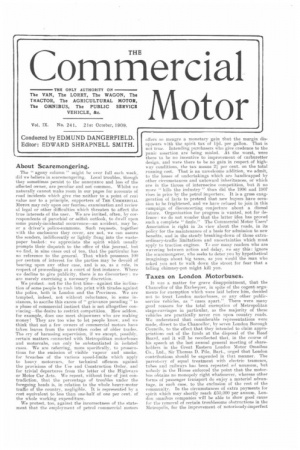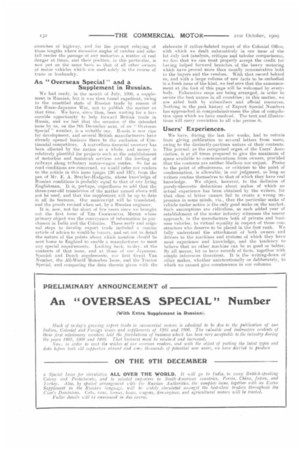About Scaremongering.
Page 1

Page 2

If you've noticed an error in this article please click here to report it so we can fix it.
The " agony colunm " might be over full each week, did we believe in scaremongering. Local troubles, though they sometimes persist to the annoyance and loss of the affected owner, are peculiar and not common. Whilst we naturally cannot make room in our pages for accounts of road incidents which give rise neither to a point, of real value nor to a principle supporters of THE COMMERCIAL MOTOR may rely upon our fearles.3 examination and review of legal or other difficulties which threaten to affect the true interests of the user. We are invited, often, by correspondents of parochial or selfish outlook, to dwell upon some purely-incidental occurrence—an accident, may be, or a driver's police-summons. Such requests, together with the enclosures they cover, are not, we can assure the senders, indifferently or lightly flung into the wastepaper basket: we appreciate the spirit which usually prompts their dispatch to the office of this jourual, but we find, in nine eases out of ten, that the particular has no reference to the general. That which possesses 100 per centum of interest for the parties may be devoid of bearing upon any other ease, and is so, as a rule, in respect of proceedings at a court of first instance. Where we decline to give publicity, there is no discourtesy: we are merely exercising a necessary discretion.
We protest --not for the first time—against the inclination of some people to rush into print with tirades against the police, both in London and the Provinces. We are tempted, indeed, not without reluctance, in some instances, to ascribe this excess of " grievance parading " to a phase of commercial instinct that is not altogether convincing—the desire to restrict competition. How seldom. for example, does one meet. shipowners who are making money! They are too wise to let people know, and we think that not a few owners of commercial motors have taken leaves from the unwritten codes of older trades. The cry of harassing supervision, if we except. possibly. certain matters connected with Metropolitan motorbuses and motorcabs, can only be substantiated in isolated. cases. We are referring, more specifically, to prosecutions for the emission of visible vapour and smoke, for breaches of the various speed-limits which apply to heavy motorcars, for technical offences against the provisions of the Use and Construction Order. and for trivial departures from the letter of the Highways or Motor Car Acts. We repeat, without fear of just contradiction, that the percentage of troubles under the foregoing heads is, in relation to the whole heavy-motor traffic of the country, negligible. It is represented by a cost equivalent to less than one-half of one per cent. of the whole working expenditure.
'We protest, too, against the incorrectness of the statement that the employment of petrol eommercial motors
offers so meagre a monetary gain that the margin disappears with the spirit tax of LW. per gallon. That is not trite. Intending purchasers who give credence to the panic assertion are being misled. At the worst, were there to be no incentive to improvement of carburetter design, and were there to be no gain in respect of highway conditions, the tax means 2; per cent. on the total running cost. That is an unwelcome addition, we admit, to the losses of undertakings which are handicapped by other circumstances and untoward inheritances, or which are in the throes of internecine competition, but it no more " kills the industry " than did the 1906 and 1907 rises in price by the petrol importers. It is a gross exaggeration of facts to pretend that new buyers have occasion to be frightened, and we have refused to join in this campaign of disconcerting conjecture about a dismal future. Organization for progress is wanted, not for defence: we do not wonder that the latter idea has proved such a complete " fizzle." The Commercial Motor -Users' Association is right in :ts view about the roads, in its policy for the maintenance of a basis for admission to new benefits, and in the steady breaking-down of those extraordinary-traffic limitations and uncertainties which must apply to traction engines. Ti our many readers who are wavering between action and delay, we say this: ignore the scaremongerer, who seeks to dieter you by hypothetical imaginings about big taxes, as you would the man who asked you not to walk down the street for fear that. a falling chimney-pot might kill you.
Taxes on London Motorbuses.
It was a matter for grave disappointment, that the Chancellor of the Exchequer, in spite of the cogent arguments for exemption which were laid before him, decided not to treat London motorbuses, or any other publicservice vehicles, as " cases apart." There were many good reasons for the total exemption of Metropolitan stage-carriages in particular, as the majority of these vehicles are practically never run upon country roads. We understand that considerable representations were made, direct to the Chancellor, by seven London Borough Councils, to the effect that they intended to claim appropriations out of the funds at the disposal of the Road Board, and it will be recollected that, in the course of his speech at the last annual general meeting of shareholders in the Great Eastern London Motor Omnibus Co., Ltd., Sir Thomas D. Pile, Bart., urged that London contributions should be expended in that manner. The parrot-cry of equal treatment with electric tramcars, tubes and railways lass been repeated ud nauseam, but nobody in the House enforced the point that the motorbus obtains no monopoly right whatsoever, whereas other forms of passenger transport do enjoy a material advantage. in each case, to the exclusion of the rest of the community. In the circumstances of extra payments for spirit which may shortly reach £50,000 per annum, Lon110)1 omnibus companies will be able to show good cause for the removal of certain troublesome obstructions in the Metropolis, for the improvement of notoriously-imperfect
stretches of highway, and for the prompt relaying of those lengths where excessive angles of camber and side.. tall render the passage of any motorbus a matter of real danger at times, and their position, in this particular, is now put on the same basis as that it all other owners of motor vehicles which are used 8u1ely in the course of trade or husbandry.
An "Overseas Special" and a Supplement in Russian.
We had ready, in the month of July, 19(16, a supplement in Russian, but it was then found expedient, owing to the unsettled state of Russian trade by reason of the Russo-Japanese War, not to publish the matter at that time. We have, since then, been waiting for a favourable opportunity to help forward British trade in Russia, and we feel that the occasion of the intended issue by us, on the 9th December next, of an " Overseas Special " number, is a suitable one. Russia is now ripe for development, and several British manufacturers have already opened business there to the exclusion of Continental competitors. A marvellous rinaneial recovery has been effeeted by the nation as a whole, and money is relatively plentiful for projects such as the establishment of motorbus and motorcab services and the feeding of railways along tributary motor-wagon routes. So far as road conditions are concerned, we would refer our readers to the article in this issue (pages 136 and 137), from the pen of Mr. E. A. Braylev-Hodgetts, whose knowledge of Russian conditions is probably equal to that of any living Englishman. It is, perhaps, superfluous to add that the three-year-old translation of the matter named above will not be used, and that the supplement. will be up to date in all its features. Our manuscript will be translated, and the proofs revised when set, by a :Russian engineer.
It is, now, not far short of five years sinee we brought out the first issue of THE COMMEHCIAL MOTOR who primary object was the conveyance of information to purchasers in India and the Colonies. These early and original steps to develop export trade ineltided a concise article of advice to would-be buyers, and set out in detail the nature of the points about -kohielt mention should be sent borne to England to enable a manufacturer to meet any special requirements. Looking back. to-day, atthe contents of that issue, and at those of our japanese. Spanish and Dutch supplements, our first Great Van Number, the All-World Motorbus Issue, and the Tractor Special, and comparing the data therein given with the
elaborate if rather-belated report of the Colonial Office, with which we dealt exhaustively in nor issue of the 1st .lnly last (anahrsis, critique and tabular comparisons), we feel that we can most properly accept the credit for having helped forward branches of the heavy motoring which have proved more than usually remunerative both La the buyers and the vendors. With that record behind us, and with a large volume of new facts to be-embodied in a fresh issue of the kind, we feel sure that the announcement at the foot of this page will be welcomed by everybody. Exhaustive steps are being arranged, in order to secure the best names in all countries; in this matter, we are aided both by subscribers and official resources. Nothing in the past history of Export Special Numbers has approached in comprehensiveness the plan of compilation upon which we. have resolved. The text and illustrathms will carry conviction to all who peruse it.
Users' Experiences.
We -have, during the last few weeks, had to refrain from giving publication to several _letters from users, owing to the distinetly-partisan nature of their contents. This journal, as the recognized organ of the -Users' Association, is at all times prepared to give the maximum of space available to communications from owners, provided that the contents are neither libellous nor unjust. Praise to the point of effusiveness, or criticism to the paint of condemnation, is allowable, in -OUT judgment, so long as writers confine themselves to that of which they have real knowledge. We object, however, to the inclusion of purely-theoretie deductions about makes of which no actual experience has been obtained by the writers, for that class of letter cannot fail to create a wrong impression in some minds, viz., that the particular make of vehicle under notice is the only good make on the market, Such assumptions are riffle-L-11mm, as each added year of establishment of the motor industry witnesses the nearer approach, in the manufacture 'both of private and business vehicles, to virtual equality in respect of those constructors who deserve to be placed in the first rank. We fully understand the, attachment of both owners and drivers to the machines and systems of which they have most experience and knowledge, and the tendency to believe that no other machine can he as good or better. By all means, let us have records of facts, together with simple inferences therefrom. It is the writing-down of other makes, whether unintentionally or deliberately, to which we cannot give countenance in our columns.






















